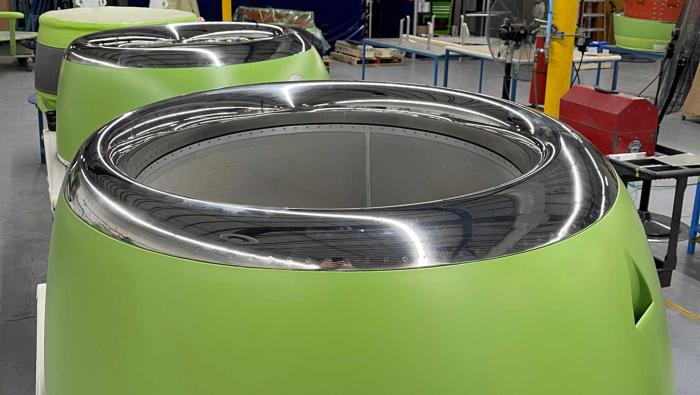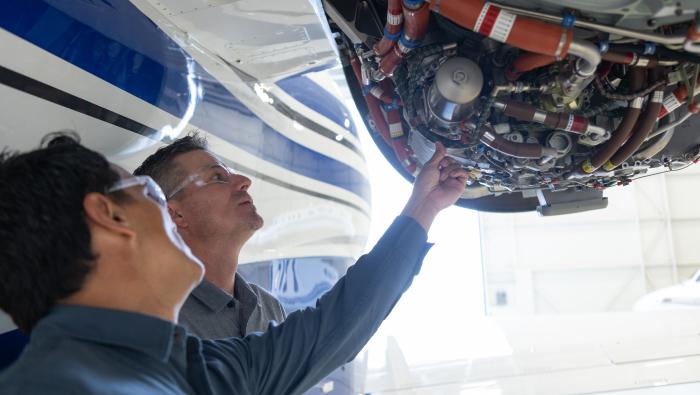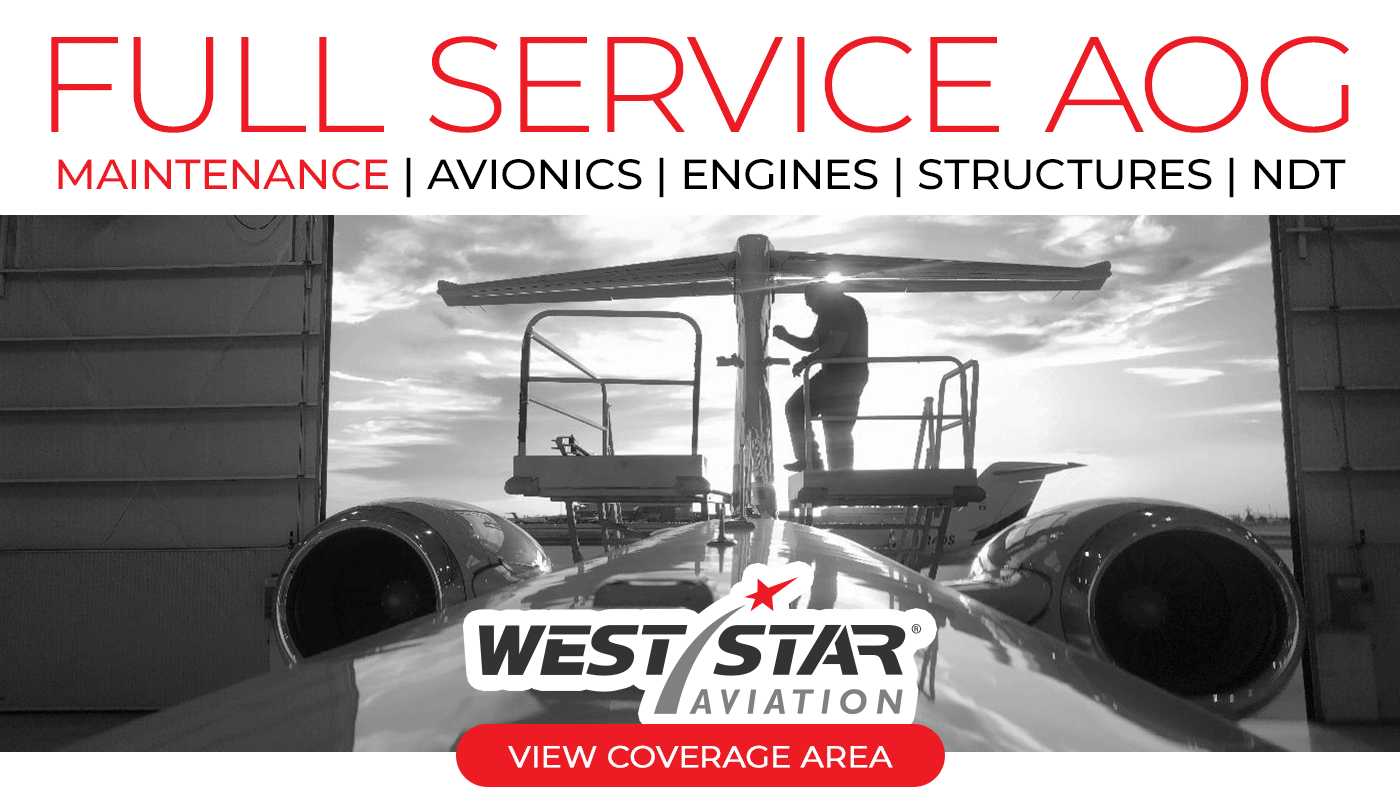
Quiet Technology Aerospace (QTA) this week delivered its 500th inlet cowl upgrade incorporating a carbon-fiber replacement inner barrel to a U.S.-based business jet fleet operator. The milestone inlet will be installed on a Honeywell HTF7350 engine on a Bombardier Challenger 350, QTA told AIN.
The company’s inlet upgrade replaces the aluminum-based inner barrel with a lighter-weight carbon-graphite composite barrel that will not corrode. Barrel corrosion and acoustic-screen degradation are known issues with the aluminum barrels on HTF7000-series engines that power various super-midsize business jets. QTA also has a similar STC’d upgrade for Pratt & Whitney Canada PW300-series engines on the Hawker 1000, Learjet 60/60XR, and Dassault Falcon 2000EX/LX, as well as Rolls-Royce Tay Mk 611-8C turbofans on the Gulfstream G450.
Meanwhile, the company also received an FAA approved model list STC for its CP 70 titanium skins for thrust reverser doors and aft body side beam assemblies for aircraft powered by HTF7000-series engines, namely the Challenger 300/350/3500, Gulfstream G280, Cessna Citation Longitude, and Embraer Legacy 450/500 and Praetor 500/600. The titanium skins cover the complete aft section of the inner surface where the jet exhaust impinges and corrosion can occur. QTA said it completed its 35th thrust reverser upgrade this month.
|
The FAA has proposed updating airworthiness standards for transport-category aircraft, engines, and propellers to guard against potential cybersecurity threats. Applying to FAR Parts 25, 33, and 35, the proposal released yesterday would outline requirements for type certification and continued airworthiness to protect equipment, systems, and networks against “intentional unauthorized electronic interactions” that could compromise safety.
Under the proposal, manufacturers or others seeking certification would be required to identify, assess, and mitigate potential hazards and develop instructions for continued airworthiness to protect the aircraft and its components while in service.
According to the FAA, much of the proposal reflects currently required practices, most of which were established through special conditions. “Thus, the impact on applicants and operators [of the proposal] would not be significant,” the agency said. “The intended effect of this action is to reduce the costs and time necessary to certify new and changed products and harmonize FAA regulatory requirements with the regulations that other civil aviation authorities are using to address cybersecurity vulnerability.”
These regulations are increasingly necessary, the FAA added, because newer aircraft have designs with much more system integration and connectivity, including to outside sources such as field-loadable software, maintenance laptops, airport gate link networks, USB devices, portable electronic flight bags, GPS, and cellular and satellite communications.
Comments on the proposal are due October 21.
|
Levo Aero, a growing technology company aimed at small to medium-size Part 135 air charter operators, has formed a partnership with NATA that will provide its members with a free 90-day trial of the entire Levo product line.
Led by industry veteran Joe Moeggenberg, Levo has released a software suite for charter operators and brokers that includes its enterprise resource planning, customer resource management, and collaborative workflow SmartInbox products. Users will also have access to the Levo marketplace, a B2B platform that allows retail customers to purchase private charter trips and book empty-leg seats in real-time directly from the aircraft operator.
“The industry is rapidly evolving, requiring more sophisticated, efficient approaches to meet operational demands,” said Moeggenberg, adding this is increasingly important for smaller Part 135 operators. “The Levo Aero team and its technological abilities are equipped and perfectly timed to tackle these challenges and modernize the industry—for both operators and retail consumers.”
Levo's goal is to build the world's largest network of on-demand aircraft, as well as make trips and data available to the public.
“NATA is excited by the potential for Levo’s platform to help members build business better through enhanced operational efficiencies, expanded customer networks, and increased savings,” said NATA v-p of communications Shannon Chambers. “We look forward to working with Levo to advance industry success through NATA’s Partner+ member support and benefit platform.”
|
Sponsor Content: FlightSafety International
FlightSafety International, the go-to name in pilot training, offers extensive programs for maintenance technicians. Programs developed closely with aircraft and engine manufacturers foster a better training environment. These strategic partnerships stretch back years, bringing valuable and informed OEM data and insights to the development and upkeep of each technician program.
|
Australia’s Wagner Sustainable Fuels has initiated a feasibility study to equip its planned Brisbane sustainable aviation fuel (SAF) refinery. The company is favoring the application of CirculAir, a technology developed by LanzaTech Global and its LanzaJet subsidiary that converts waste feedstocks into SAF.
CirculAir uses LanzaTech’s carbon recycling technology to convert locally sourced feedstocks including industrial emissions and municipal solid waste into ethanol, which is then transformed into SAF via LanzaJet’s alcohol-to-jet process.
Supported by Boeing and the Queensland government, the project is viewed as a source of new jobs in the region while increasing Australia’s domestic energy security and reducing greenhouse gas emissions from aviation.
“LanzaTech and LanzaJet look forward to providing a joint commercial solution to support the work of Wagner Sustainable Fuels and advance the development of a domestic Australian SAF market,” said LanzaTech CEO and LanzaJet board chair Jennifer Holmgren. “There is enough carbon above ground to transform the 100 billion gallons of fossil fuel-derived jet fuel consumed each year into reliable jet fuel made by recycled carbon, and the flexibility of the CirculAir technology makes it possible for this project to unlock the myriad waste-based resources required to meet that demand.”
The feasibility study is expected to conclude by the end of the year, and Wagner expects to begin construction on the project—which could produce up to 27 million gallons of SAF a year—in 2026.
|
Luxaviation UK has announced a “welcome upgrade” that will allow pets of all sizes to join their owners in the cabin on flights throughout Europe. Post-Brexit, traveling with pets between the UK and the EU involves new requirements.
“At Luxaviation, we are constantly striving to set new standards in luxury travel, not just for our human passengers but for their cherished pets as well. This new exemption underscores our dedication to innovation and customer care, allowing pets to experience the same comfort and freedom as their owners. We understand the deep bond between our clients and their pets, and we are proud to offer a travel experience that respects and enhances that connection.”
Under a new regulatory exemption gained by the charter operator, family dogs of all sizes can travel freely in Luxaviation’s aircraft cabins, requiring only a harness restraint during takeoff, landing, and turbulence.
Previously, only smaller pets were afforded this treatment, while larger dogs and other animals weighing more than 8 kg had to be safely secured in a crate during takeoff and landing, increasing stress levels for pets and owners.
Luxaviation said the exemption, gained under IATA’s Live Animals Regulations, upholds its commitment to ensure animals’ safety and well-being throughout each journey.
|
SUSTAINABILITY QUESTION OF THE WEEK
What issue arises when reporting on the environmental impact of sustainable aviation fuel (SAF)?
- A. Jet-A and SAF may be measured and reported differently depending on the reporting standard.
- B. SAF cannot be used as aircraft fuel.
- C. SAF produces more carbon emissions than regular aviation fuel.
- D. The benefits of SAF for the environment depend on the aircraft type.
|
With upcoming mandates for Part 135 operators, now is the time to think about your Safety Management System. Join us on September 17 at noon ET to learn how you can go beyond compliance to drive true ROI with easy-to-implement SMS software. We'll also discuss how paper-based approaches to SMS can leave you with blind spots and how an integrated approach to SMS, QMS, and Risk can deliver outsized ROI. Sponsored by TrustFlight.
|
UPCOMING EVENTS
- EGYPT INTERNATIONAL AIRSHOW 2024
- EL DABAA, MATROUH GOVERNORATE, EGYPT
-
 September 2 - 5, 2024 September 2 - 5, 2024
- ADVANCED AIR MOBILITY SYMPOSIUM
- MONTREAL, CANADA
-
 September 9 - 12, 2024 September 9 - 12, 2024
- JETNET IQ SUMMIT
- NEW YORK, NEW YORK
-
 September 24 - 25, 2024 September 24 - 25, 2024
- NBAA TAX, REGULATORY & RISK MANAGEMENT CONFERENCE
- LAS VEGAS, NEVADA
-
 October 20 - 21, 2024 October 20 - 21, 2024
- NBAA BUSINESS AVIATION CONVENTION & EXHIBITION (NBAA-BACE)
- LAS VEGAS, NEVADA
-
 October 22 - 24, 2024 October 22 - 24, 2024
- REGIONAL AIR CARGO CARRIERS ASSOCIATION CONFERENCE
- SCOTTSDALE, ARIZONA
-
 October 29 - 31, 2024 October 29 - 31, 2024
- CORPORATE AVIATION LEADERSHIP SUMMIT (CALS), MX
- ORLANDO, FLORIDA
-
 November 18 - 19, 2024 November 18 - 19, 2024
|
 |
|
AINalerts News Tips/Feedback:
News tips may be sent anonymously, but feedback must
include name and contact info (we will withhold name on request). We reserve the
right to edit correspondence for length, clarity, and grammar. Send feedback or
news tips to AINalerts editor Chad Trautvetter.
|
AINalerts is a publication of AIN Media Group, 214 Franklin Avenue, Midland Park, New Jersey. Copyright 2023. All rights reserved.
Reproduction in whole or in part without permission is strictly prohibited.
|
|














